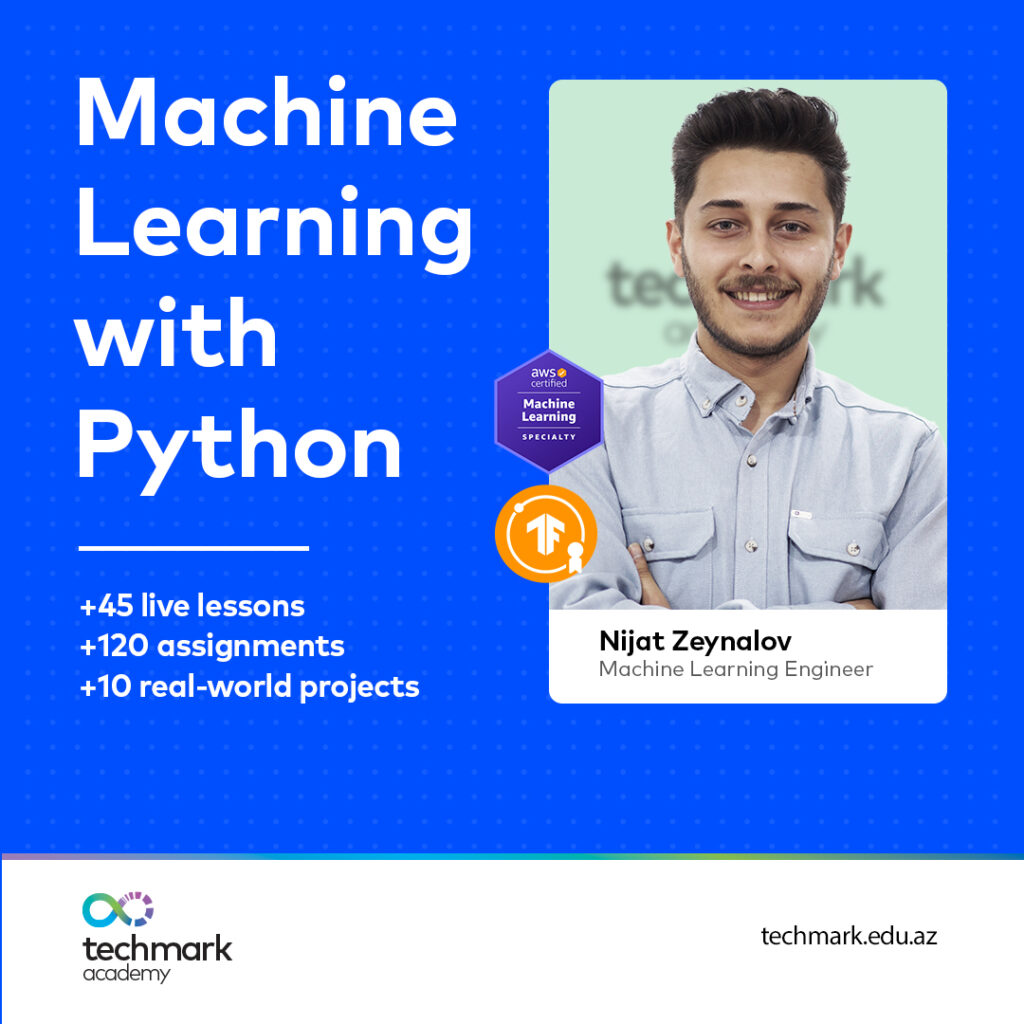Machine Learning with Python Kursu
Machine Learning with Python Kursu – 4 Aylıq Təlim Proqramı
Python proqramlaşdırma dili ilə Machine Learning (maşın öyrənməsi) kursu sizə proqramlaşdırmanın əsaslarından başlayaraq, Web scraping, Riyaziyyat, SQL, Machine Learning alqoritmləri, Feature Engineering kimi gərəkli mövzular öyrədir və tam sıfırdan başlayanlar üçün uyğun təlimdir.

Machine Learning with Python kursu nə öyrədir
- Python əsasları
- ML üçün əsas SQL kommandları
- Maşın Öyrənməsi üçün Riyaziyyat: Xətti Cəbr, Matrislər, Statistika bu modulda əhatə olunur.
- Məlumat sızması olmadan məlumatların hazırlanması
- Maşın Öyrənməsi üçün Advanced Feature Engineering
- Supervised and unsupervised yanaşmalar
- Maşın öyrənmə problemləri (məsələn, reqressiya, təsnifat, klasterləşdirmə)
- Maşın öyrənmə alqoritmləri (məsələn, xətti, K-ən yaxın qonşular, K-vasitələr, Ağaclar)
Machine Learning kursu with Python kursu təklif edir:
Nicat Zeynalov
Machine Learning with Python kursu proqram rəhbəri
Nicat Zeynalov çoxşaxəli, AWS və Google Sertifikatlı Maşın Öyrənmə Mühəndisidir. ML alqoritmlərinin inkişaf etdirilməsi, tətbiqi, alqoritmlərin nəticə çıxarma məntiqləri üzrə təcrübəsi mövcuddur.
Hazırda Azerconnect şirkətində Machine Learning Mühəndisi olaraq çalışır. Proqnozlaşdırılan modelləşdirməyə (Predictive Modelling) əsaslanan Machine Learning həlləri üzrə +3 illik proqramlaşdırma təcrübəsinə malikdir.
Machine Learning with Python Kursu Sillabusu
7 modul • Github layihələr • +100 saat dərs
Students are also Interested in:
32 Courses • 702 Video Tutorial

Digital Marketing Analytics
11 sections • 28 lecture • 19h 33m total length

Marketing in a Digital World
11 sections • 28 lecture • 19h 33m total length

Marketing Analytics in Theory
11 sections • 28 lecture • 19h 33m total length

Marketing Analytics in Practice
11 sections • 28 lecture • 19h 33m total length

Marketing in an Analog World
11 sections • 28 lecture • 19h 33m total length

Search Engine Optimization
11 sections • 28 lecture • 19h 33m total length

Display Advertising
11 sections • 28 lecture • 19h 33m total length

Email Marketing
11 sections • 28 lecture • 19h 33m total length

Metrics with Google Analytics
11 sections • 28 lecture • 19h 33m total length

Record olunmuş təlim materialları
Təlim materialları Learning Manegement System tərəfindən tam mərkəzləşdirilmiş formada təqdim olunur. Materiallar daim əlçatandır.

Ekspert müəllimlər
Sektorun ən peşəkar müəllimlərindən dərs alaraq məzun ola bilərsiniz. İştirakçılara fərqlənmə və iştirak diplomları nəticələrinə uyğun təqdim olunur.

Daimi dəstək
Məzunlarımızla daimi görüşlərimiz baş tutur, karyera və fərdi inkişafla bağlı dəstək proqramımız onlara kursdan sonra da kömək edir.
Machine Learning with Python kursu ilə süni intellekt dünyasına addım at!
Machine Learning təlimi ilə sizə süni intellektlərin alqoritmlərini anlamaq, müxtəlif python layihələri, ML funksiyaları və ML alətləri ilə işləmək imkanı yaradacaq. Təlim əsnasında sizə faydalı təcrübə yaşadacaq, yeni biliklər öyrədərək karyeranızın inkişafını təmin edəcəyik.
